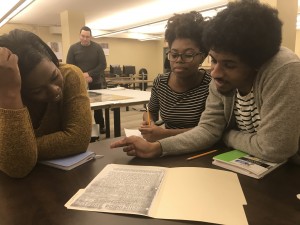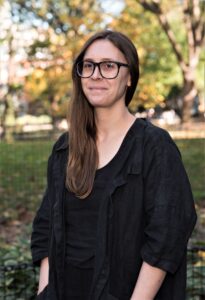Faces of ALBA: Shannon O’Neill, Tamiment Curator
In 2019, Shannon O’Neill became the curator for the Tamiment-Wagner Collections of the New York University Special Collections that houses the ALBA archives. She previously worked at Barnard College, the Los Angeles Public Library, and the Atlantic City Free Public Library.
What drew you to the Tamiment Library and Robert Wagner Labor Archives?
Working at the Tamiment is something of a return for me. I was an undergraduate at NYU and had an assignment where I had to utilize the archives in my coursework. As a first-generation student, I spent a lot of time just figuring out how to navigate the university; I had no idea what a Bursar was or how to effectively use office hours. No one prepared me for any of that. I recall feeling so intimidated by the assignment. I wasn’t even quite sure how archives operated. Maybe it’s because I come from a union family (my dad was a part of the Sheet Metal Workers’ Local 27 that also supplied me with a generous scholarship for my studies), or maybe it was because I was politically active as a teenager, but I felt at home in the Tamiment. Following my research in the collections, I decided I wanted to be an archivist. It’s a real honor to take up the torch of continuing to care for these collections, especially considering that they completely changed my life.
As you have gone through the Abraham Lincoln Brigade Archives collection, has there been a set of documents that has stood out to you? Have you found any surprises in the collection?
The women of the Abraham Lincoln Brigade are endlessly inspiring, especially Salaria Kea. I am really grateful to have learned about her story through working with the ALBA collections. The ALBA collections’ documentation of her life and work during the Spanish Civil War are some of my favorite materials to bring into the classroom. As far as surprises go, we have both a rifle and a medic’s stretcher in the collection which are two objects that I didn’t necessarily expect to see. What’s unsurprising, and incredibly humbling, is the community that exists around these collections. Though I’ve only been at the Tamiment for a little less than two years, the majority of which has been under quarantine conditions, I’ve been grateful to meet so many family members of those who served in the Abraham Lincoln Brigade, so many supporters and advocates for the collections, and so many researchers whose work is enriched by the documentation. It’s been a real joy to be introduced to this community, and I’m excited to continue our conversations and collaborations.
Is the collection still being developed?
Absolutely! We’ve had a pause collecting since the outset of the pandemic; however, we are slowly beginning to resume our regular workflows. There are a few collection development conversations that were placed on hold in the last year, and I’m looking forward to reaching back out to folks to restart those discussions.

Hunter College students research the ALBA Collection at the Tamiment Library (NYU), April 2018. Photo María Hernández Ojeda.
You became curator for the Tamiment Library in the fall of 2019, which means that you had about six months of normalcy. What is it like curating an archive during a global pandemic? Are there things that you are doing now that you’ll continue to do after the pandemic?
To be honest, it’s been really hard. I want my work as a curator to be relational and not transactional. I enjoy meeting with people and hearing about their histories and sharing ideas with one another about how to best preserve those histories. I want people to be supported and affirmed in their choices to place their documentation in an archive. For those who don’t want to place their collections in an archive, I want to share resources for how they can archive their materials themselves or within their communities. It’s been difficult to do this remotely, though I’ve found ways to keep in touch with folks. Much of the work I’ve been doing over the last 15 months has focused on digital collections and digital preservation, and I’m eager to think about how that work might extend to the ALBA collections.
I’ve really enjoyed reading social media posts from the Tamiment. What are other ways that people can engage with the collection?
We have an exciting slate of public programming that is an important extension of our collections. We host dialogues, book talks, forums, and workshops on historic and contemporary issues related to social movements, politics, the Cold War, anti-fascism, labor, and histories of immigration and migration. Though reopening plans are still in progress as of July 2021, our collections are accessible to the public. I encourage folks to reach out to us as special.collections@nyu.edu to ask about how they can utilize the collections. While I’m unsure what in-person access will look like come the Fall, we have been offering a range of remote options for the last year and a half. My colleagues and I are looking forward to continuing to support engagement and access to the collections.
You have written about the heavy hand of the archivist who has the power to erase marginalized peoples from history. How are you counter-acting that power? Does it relate to your interest in community-based archiving?
Thank you for this question! On a personal level, I reflect often on my positionality as a white, queer, middle-class, cis-woman. How does my identity impact or inform the way in which I come to this work? Archives are not neutral spaces, and curatorial work is not impartial. I see it as one of my responsibilities to uplift and amplify stories that have been marginalized. I think critically about the resources I have access to at an institution like NYU and how those resources are shared and distributed. Additionally, I’ve been doing an in-depth analysis of our processing backlog, and I am making progress on creating a fully prioritized backlog which pushes collections that are by and about people of color, queer people, disabled people, and poor people to the top of the queue. This work very much aligns with my interest in community-based archiving. Communities should have agency and authority over their records, and my work aims to support this.
Aaron Retish teaches at Wayne State University.













